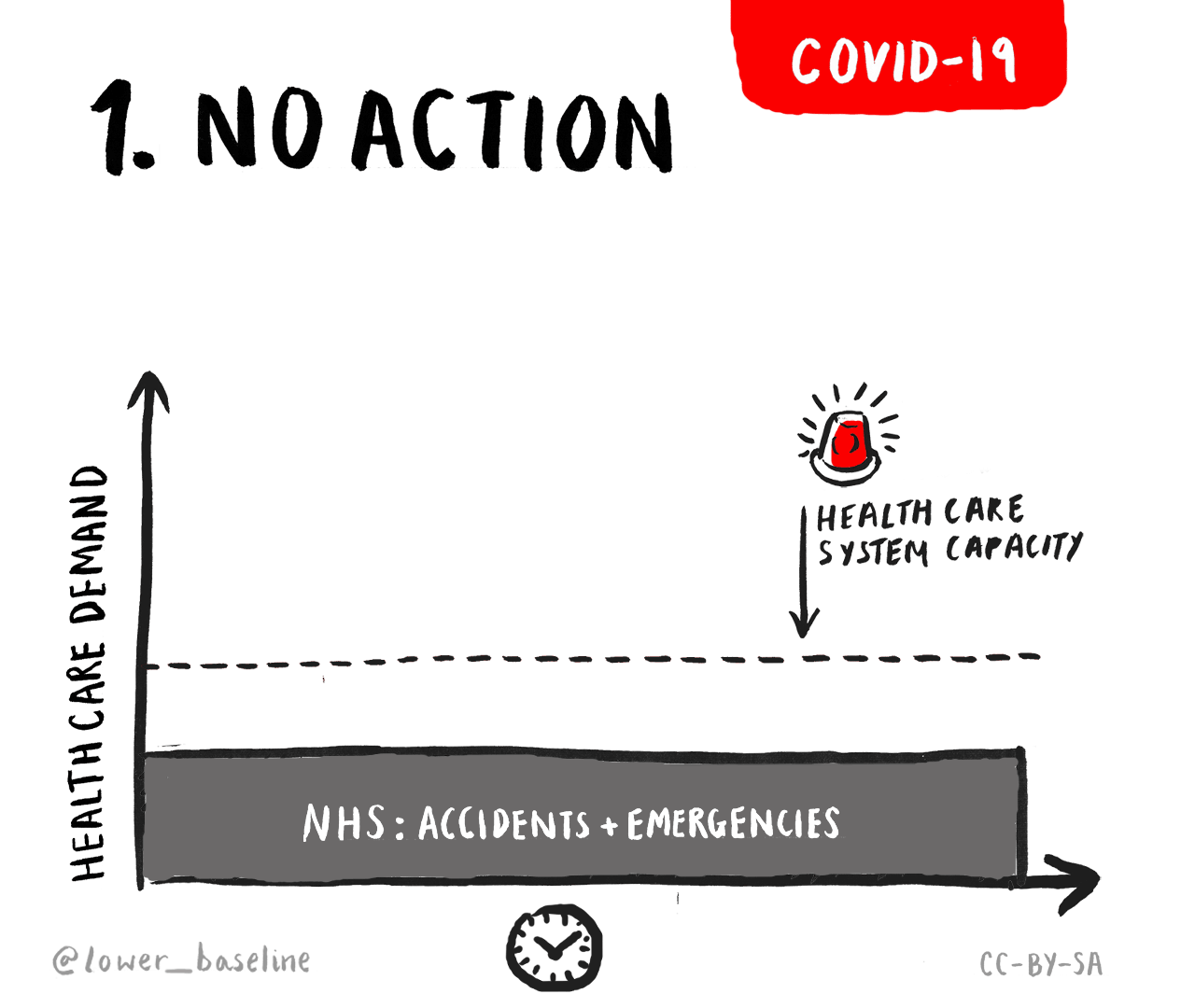The public have rapidly picked up on the need to “flatten the curve” of covid-19 and the NHS is exploring all options to increase its capacity. But are we missing a trick by not also working to lower the baseline demands placed on the NHS?
The UK is currently attempting to prevent its acute healthcare services from becoming overwhelmed by covid-19 in the coming weeks. So far, the major focus has been on both “flattening the epidemic curve” and scaling up intensive care capacity. It remains to be seen whether these measures will be sufficient. However, there is a third major approach with potential benefits: “reducing the baseline” demand for NHS acute services through the rapid introduction of public health policies.
These policies—by addressing major drivers of acute healthcare demand, including trauma, cardiopulmonary disease, and falls in the elderly—now merit urgent attention from the government and its advisers, and provide three concrete examples to open this discussion. The bold and creative leadership needed from across the government to implement these measures is in line with the unprecedented action recently taken to close all schools, cafes, pubs, gyms, restaurants, leisure centres, cinemas, theatres, and nightclubs.
First, we suggest an immediate reduction in motor vehicle speed limits. In England alone there are around
35 000 non-fatal admissions to hospital every year related to road traffic accidents; more than one in 10 of these are serious and likely to require intensive support, including anaesthesia and surgery. Evidence from around the world shows that lowering speed limits can lead to major reductions in injuries. In Canada, for example, lowering the speed limit from 40km/h to 30km/h was associated with a 28% decrease in pedestrian-motor vehicle collisions and a 67% decrease in major and fatal injuries.
This measure would be particularly important in supporting those who follow government advice and avoid non-essential use of public transport in order to maintain social distancing. We therefore suggest that the government urgently explore an emergency reduction of all national speed limits to 50mph, and to 20mph in urban areas. These policies are already supported by the Road Safety Management Capacity review, the Royal College of Paediatrics and Child Health, and the Royal Society for the Prevention of Accidents. We expect that the public would support this proposal for a limited time period if it was communicated appropriately in relation to the current NHS emergency.
Similarly, tobacco smoking is responsible for nearly half a million hospital admissions per year, representing 22% of all admissions for respiratory diseases. If the UK accelerated its considerable current commitment to tobacco control plans, it may well yield quick results. After all, in the aftermath of Scotland’s introduction of legislation outlawing smoking in enclosed public places, we saw a rapid 20% drop in hospital admissions for acute coronary syndrome in men over 55 years and women over 65 years. The World Health Organization has also indicated that tobacco use may be a risk factor for developing more serious symptoms from covid-19.
A related consideration is whether we should extend the minimum unit pricing for alcohol, which has already been implemented in Scotland and Wales, to the rest of the UK—in particular limiting sales of super strength alcohol. Alcohol misuse is associated with accidents, injuries, and violence. In Scotland, the introduction of minimum unit pricing had an immediate impact in reducing alcohol purchases and, by inference, consumption.
Finally, with many in the population isolated at home, we must act to ensure that homes remain warm and that isolation does not exacerbate pre-existing disease. Fuel poor households are often more expensive to heat, fuel inefficient, and home to older people with more pre-existing health conditions. The government could use its Warm Home Discount Scheme, which offers payments to certain groups during winter, and extend it to all households through spring 2020.
We encourage Public Health England and equivalent bodies in other nations, chief medical officers, and the Scientific Advisory Group for Emergencies (SAGE) to examine these and other emergency public health measures to reduce the burden of non-covid-19-related disease on the NHS. We are aware of other groups undertaking detailed modelling of these proposed strategies, yet awaiting the findings should not halt decisive action.
In order to provide a forum for sharing ideas and evidence to support this, we have set up LowerTheBaseline.org and invite contributions of ideas, evidence, and analysis, which we will summarise and share with policy makers in and beyond the UK. Follow us on Twitter @Lower_Baseline

Sunil Bhopal is an NIHR academic clinical lecturer in population health paediatrics, Newcastle University, and honorary assistant professor, London School of Hygiene & Tropical Medicine. Twitter: @SunilBhop
Guppi Kaur Bola is a public health researcher & strategist. Twitter: @guppikb
Robert Hughes is a clinical research fellow, London School of Hygiene and Tropical Medicine. Twitter @R_Hughes1
Anya Gopfert is a public health registrar. Twitter @anyagopfert
Anand Bhopal is a PhD candidate at the University of Bergen, Norway focusing on the health impacts of climate change. Twitter @abhopal_1
Competing interests: The authors have read and understood BMJ policy on declaration of interests and we do not have any conflicts of interests to declare
